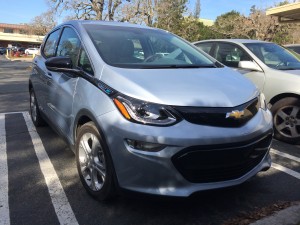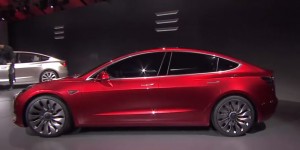The news that Republicans are targeting the $7,500 federal tax credit for electric vehicles has stirred up automakers, who are relying on the incentives to boost demand for their EV investments. The incentive was created in 2008 through a bipartisan deal, with environmentalists teaming with national security-types concerned about U.S. dependence on foreign oil. The credit is available for the first 200,000 qualifying vehicles by each automaker. While no automaker has reached that cap, Tesla should do soon, once the Model 3 is widely available.
But how motivated is the auto industry to fight for it? Tesla certainly has the most incentive, given their all-electric line of vehicles. But so far they are mum publicly. The other automakers are mixed on electric vehicle deployment. General Motors and Nissan have gone all-in on EVs, but they still make their money on big gas cars.
And perhaps more importantly, the industry as a whole would presumably benefit from the huge corporate tax cuts proposed in the plan. They therefore may be unwilling to pick a strong fight over this one provision for just one part of their business, given how much they could benefit from the plan overall.
E&E news reports [paywalled] on the industry position:
“Eliminating the fuel-cell and EV credits will hamper progress towards getting these very clean and energy-efficient vehicles on the road,” said Gloria Bergquist, a spokeswoman for the Alliance of Automobile Manufacturers, the powerful trade group for domestic automakers.
Yet she also said the EV tax credit had not previously been a focus of lobbying as Republicans drafted their proposal. Member companies of both the car alliance and the Association for Global Automakers — the trade group for the U.S. operations of international automakers — are meeting this week to sketch out a position and strategy.
That lack of sustained interest in fighting for the tax credit is troubling. For example, the article reports that Ford Motor Co. redirected inquiries on this subject to the Alliance of Automobile Manufacturers, “a tactic most automakers assume when there’s disagreement within the industry about strategy.”
Until we see more all-electric automakers like Tesla, EV backers may have a tough road ahead relying on the auto industry for full-throated support for supportive policies. In the meantime, the tax plan still has a long way to go to becoming law, with many changes likely to occur. So we’ll have to stay tuned.
Halloween may be over, but the climate frights this week continue. Here are the scary highlights:
- Electric vehicle incentives in trouble: the Republican tax plan would eliminate the $7500 tax credit for EV purchases, which would likely torpedo sales for all but the luxury EVs in the short term. States might be able to dig deep to make up some of the difference, and the tax credit is set to phase out anyway for automakers over certain sales amounts, but nonetheless this would be a big blow to demand.
- Infill tax credits at risk: the Republican tax plan also targets federal programs that help revitalize infill neighborhoods. It would eliminate key programs like New Markets Tax Credits (NMTC), Historic Preservation Tax Credits (HTC), and the Community Development Block Grant (CDBG) program. As Smart Growth America and their infill group Locus writes in a newsletter today, “community development projects almost invariably rely on federal programs like these to fill a critical financing gap, often making the difference between a go and a no-go decision for a project penciling out.”
- Tesla Model 3 stuck in production “hell”: Tesla’s third-quarter earnings call brought bad news about the Model 3, the $35,000 mass-market EV that is struggling to meet its production targets. The company’s goal of producing 5,000 units a week by the end of 2017 has slid to the first quarter of 2018. The normally upbeat Elon Musk was apparently in a bad mood, per E&E News [paywalled]:
The call’s tone was a swing to the dark side for Musk, who on quarterly earnings calls often minimizes problems and instead trumpets the company’s successes, or announces or at least hints at some bold new initiative.
- Earth passes a carbon milestone: scientists report that the rate of carbon dioxide being released into the atmosphere accelerated at an unprecedented pace last year, reaching levels not seen in 800,000 years. Per E&E news [paywalled]:
Current levels of CO2 correspond to the Pliocene period from 3 million to 5 million years ago, when the climate was 3.5 to 5.5 degrees Fahrenheit warmer, the report found. At that time, the ice sheets of Greenland and West Antarctica were melted. Sea levels were 30-60 feet higher than they are now.
I’d say this is not a good time to invest in ocean-front property. Happy Frightful Friday!




